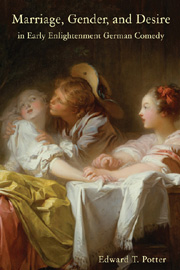Book contents
- Frontmatter
- Contents
- Acknowledgements
- List of Abbreviations
- Introduction: Comedy, the Sentimental Marriage, and Modes of Resistance
- 1 Promoting the Sentimental Marriage in Theory and in Practice
- 2 The Virgin Huntress Tamed: J. C. Gottsched's Atalanta and the Erasure of Female Autonomy
- 3 Marriage Brokering at the Expense of Economics: C. F. Gellert's Die zärtlichen Schwestern
- 4 The Clothes Make the Man: J. E. Schlegel's Der Triumph der guten Frauen
- 5 Cross-Dressing and Gender Performance in G. E. Lessing's Der Misogyne
- 6 Sickness Masks Desire in Th. J. Quistorp's Der Hypochondrist
- Conclusion
- Works Cited
- Index
4 - The Clothes Make the Man: J. E. Schlegel's Der Triumph der guten Frauen
Published online by Cambridge University Press: 05 February 2013
- Frontmatter
- Contents
- Acknowledgements
- List of Abbreviations
- Introduction: Comedy, the Sentimental Marriage, and Modes of Resistance
- 1 Promoting the Sentimental Marriage in Theory and in Practice
- 2 The Virgin Huntress Tamed: J. C. Gottsched's Atalanta and the Erasure of Female Autonomy
- 3 Marriage Brokering at the Expense of Economics: C. F. Gellert's Die zärtlichen Schwestern
- 4 The Clothes Make the Man: J. E. Schlegel's Der Triumph der guten Frauen
- 5 Cross-Dressing and Gender Performance in G. E. Lessing's Der Misogyne
- 6 Sickness Masks Desire in Th. J. Quistorp's Der Hypochondrist
- Conclusion
- Works Cited
- Index
Summary
Der Triumph der guten Frauen (The triumph of the good women, 1748), one of the comedies of Johann Elias Schlegel (1719–49), constructs gender roles and promotes a sentimental conception of marriage based on love, mutual compatibility, and free choice of partners, all via the practice of female cross-dressing. Schlegel's text highlights the culturally constructed aspects of gender by placing the performance of gender roles at the very center of the play. By staging a successful performance of male gender, the female character Hilaria reintegrates two wayward husbands into the institution of the sentimental marriage. Disguised as Philinte, Hilaria gains access to Nikander, the husband who left her ten years earlier and who has become a philanderer and is attempting to seduce Juliane, the wife of the tyrannical Agenor, as well as various other women in the town. As she competes with Nikander for Juliane, Hilaria hopes to regain her husband's love and to reeducate Juliane's husband Agenor. The text uses Hilaria's disguise and her reformatory efforts to explore the following four themes: how the control of information establishes power relationships; how cross-dressing is used to reinscribe traditional gender roles; how mutual respect and friendship are put forward as a strong basis for marriage; and finally, how sexual desire is construed as a purely male phenomenon, thereby ironizing the very possibility of female desire in general and female same-sex desire in particular.
- Type
- Chapter
- Information
- Publisher: Boydell & BrewerPrint publication year: 2012



